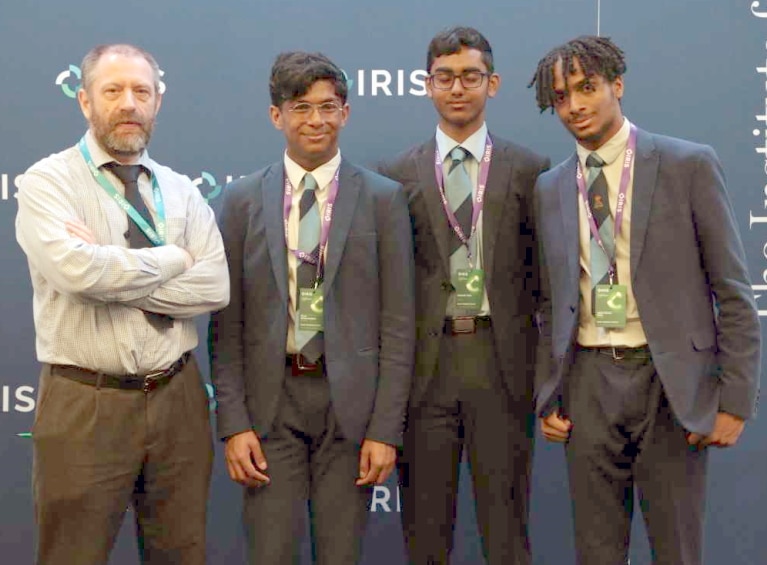
Queen Elizabeth’s School has been recognised for its commitment to pupil-led research after three sixth-formers impressed experts at a London conference with their presentation about robot navigation.
Headmaster Neil Enright has now received a certificate from the Institute for Research in Schools (IRIS) following the trio’s triumph earlier this year. They were one of only eight groups selected to present their research at the IRIS conference and were then singled out by one of the leading scientists there as her “highlight of the conference”.
In a letter accompanying the certificate, IRIS deputy director Marcus Bernard wrote: “I wanted to personally write to you and highlight the fantastic work of your colleague, Jonathan Brooke [Head of Physics], who went above and beyond to enable students at your school to carry out student-led research…
“It was a real pleasure to meet your students…They spoke eloquently and confidently about their research and were extremely well behaved, I was very impressed. They are an absolute credit to you and your team.”
Mr Enright today congratulated the three Year 13 pupils, Bhunit Santhiramoulesan, Heemy Kalam and Jashwanth Parimi on their success. “They chose the most challenging of the four options available to them – the ‘original research’ option – and then worked hard over a seven-month period, before delivering a confident, well-executed talk at short notice at the conference.”
IRIS develops opportunities for secondary-age pupils to participate in authentic research in schools and organises conferences at which pupils can share their research with their peers from other schools and the wider academic community. Around 50 other projects were displayed at the conference in which the QE boys took part. Representatives of just eight of those projects were invited to make presentations.
The QE presentation summarised the trio’s research project on automating the navigation of robots with limited sensing capabilities. They were given just two days’ notice that they would have to give their presentation.
The project had involved designing and creating a framework that generated minimal-error paths for a robot to take, given some set of points for it to pass through. They used deep reinforcement learning (a sub-field of machine learning) to achieve this, training the robot on generated paths and using a formula they had derived to quantify how good this path was.
 Mr Brooke, who accompanied them to the conference, said: “Every step of the process was driven by the initiative of the boys, and it was fitting that one of the guests on the Scientist Panel that concluded the event, Dr Harshnira Patani, Senior Scientist Pharmacology at MSD (one of the world’s leading pharmaceutical companies), singled out the boys’ presentation as her highlight of the conference, making particular note of their use of machine learning.”
Mr Brooke, who accompanied them to the conference, said: “Every step of the process was driven by the initiative of the boys, and it was fitting that one of the guests on the Scientist Panel that concluded the event, Dr Harshnira Patani, Senior Scientist Pharmacology at MSD (one of the world’s leading pharmaceutical companies), singled out the boys’ presentation as her highlight of the conference, making particular note of their use of machine learning.”
Through working on the project, Jashwanth said, the three had developed their “research and self-study skills, pushing ourselves to comprehend mathematics beyond the traditional syllabus, ranging from understanding neural networks to multivariable calculus”. He added that hearing from people with PhDs at the conference had made him consider research “as a possible future pathway”.
Heemy said: “Taking on a project with a lot of complex research independent of teacher assistance was the main challenge we faced, alongside coordinating the time spent reading literature with other schoolwork and activities.”
Bhunit added: “One of the highlights was being given the opportunity to present in front of hundreds of students and teachers , as well as being mentioned by Dr Patani as one of the projects that she found impressive.”

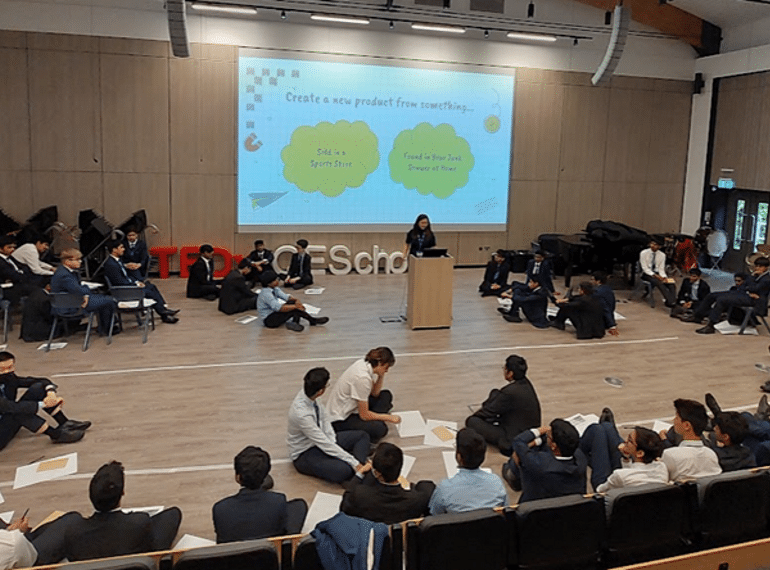
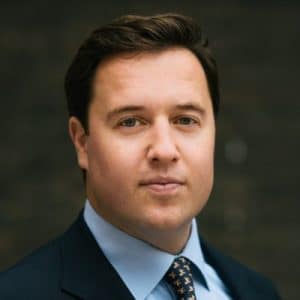 LSE Generate’s other partners include the Foreign, Commonwealth and Development Office and Makyth Ventures, the Winchester College-based entrepreneurship group which itself ran a workshop for QE in the 2022 Spring Term.
LSE Generate’s other partners include the Foreign, Commonwealth and Development Office and Makyth Ventures, the Winchester College-based entrepreneurship group which itself ran a workshop for QE in the 2022 Spring Term.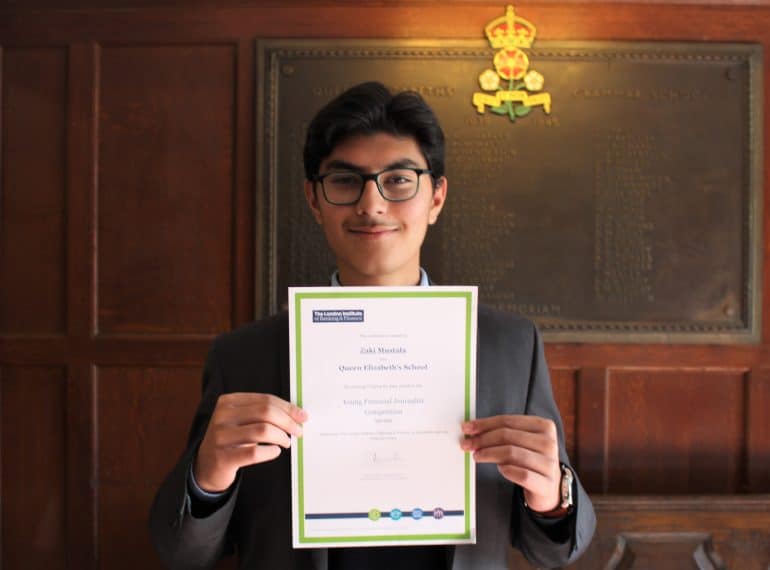
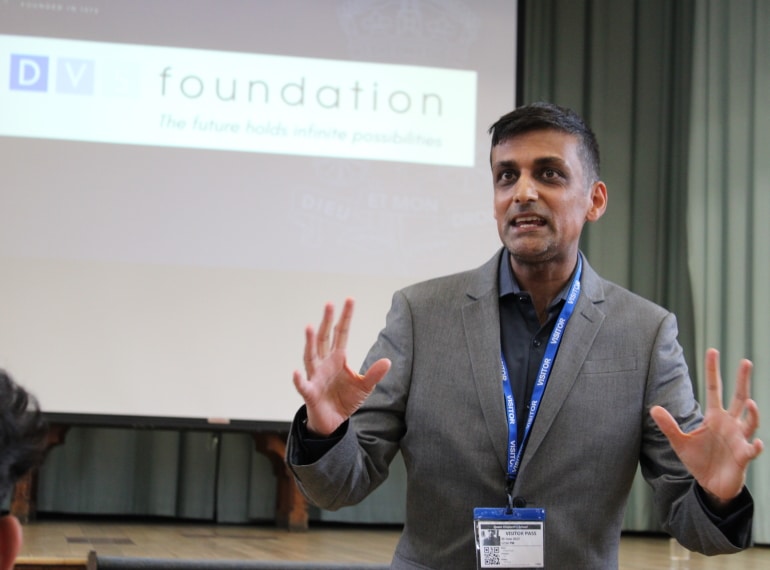
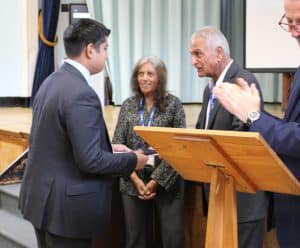 Together with his parents, Dhiru and Rami, Priyan (OE 1991–1998) visited the School to present DVS Foundation Awards to ten sixth-formers.
Together with his parents, Dhiru and Rami, Priyan (OE 1991–1998) visited the School to present DVS Foundation Awards to ten sixth-formers.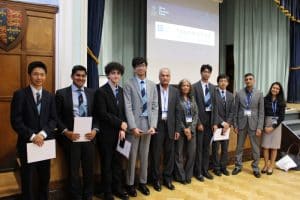 Introducing its work in a special assembly, he explained that the foundation supports other organisations as well as operating its own programmes. These include not only the awards programme, which was launched in 2021, but also its WhyOhYou personal development programme. QE plans to get involved in WhyOhYou during the autumn.
Introducing its work in a special assembly, he explained that the foundation supports other organisations as well as operating its own programmes. These include not only the awards programme, which was launched in 2021, but also its WhyOhYou personal development programme. QE plans to get involved in WhyOhYou during the autumn.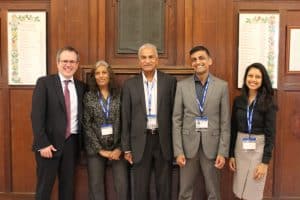 The Headmaster added: “I look forward to working with the foundation through WhyOhYou in the coming months: my thanks go to Rupal Shah for her work coordinating the scheme.”
The Headmaster added: “I look forward to working with the foundation through WhyOhYou in the coming months: my thanks go to Rupal Shah for her work coordinating the scheme.”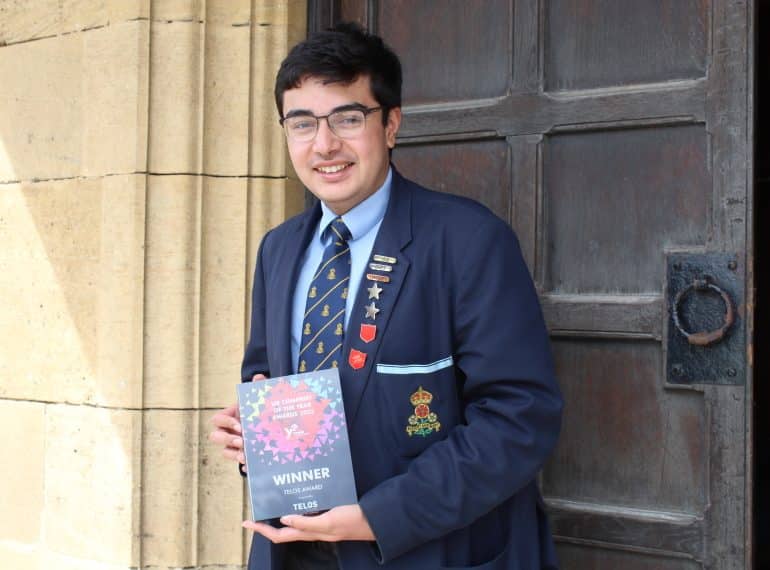
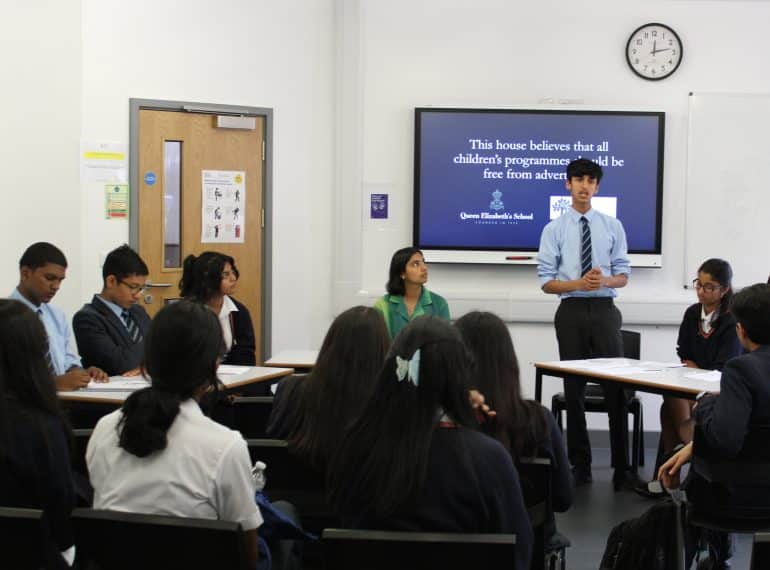
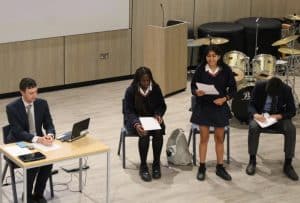 Year 8 and Year 10 pupils from QE met their counterparts from The Henrietta Barnett School for debating – part of the well-established academic partnership between the two schools.
Year 8 and Year 10 pupils from QE met their counterparts from The Henrietta Barnett School for debating – part of the well-established academic partnership between the two schools.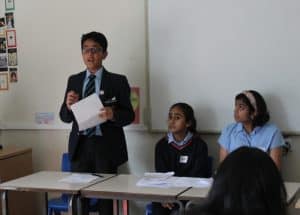 QE’s Head of Academic Enrichment, Nisha Mayer, said: “The Year 8s enjoyed an animated and enjoyable morning at HBS. They debated in mixed teams in breakout rooms before assembling for a grand final.”
QE’s Head of Academic Enrichment, Nisha Mayer, said: “The Year 8s enjoyed an animated and enjoyable morning at HBS. They debated in mixed teams in breakout rooms before assembling for a grand final.”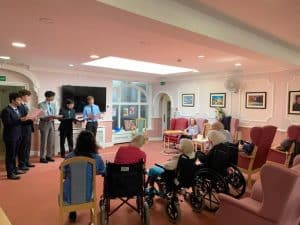 For QE Together, a concert took place at Barnet’s Abbey Ravenscroft Park Nursing Home, involving musicians from both QE and QEGS.
For QE Together, a concert took place at Barnet’s Abbey Ravenscroft Park Nursing Home, involving musicians from both QE and QEGS.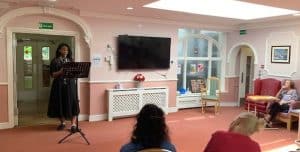 “Students at both schools have long enjoyed volunteering locally, and integrating the arts into both that and a project that brings the two schools together is but the beginning of a growing relationship with people in the local area.”
“Students at both schools have long enjoyed volunteering locally, and integrating the arts into both that and a project that brings the two schools together is but the beginning of a growing relationship with people in the local area.”